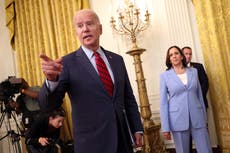Major blow to voting rights as Supreme Court upholds restrictive laws in Arizona
Reversing lower court ruling, decision from high court could make it harder to challenge GOP lawmakers’ restrictive voting laws filed in wake of 2020 elections
In a major test of what remains of the landmark Voting Rights Act, the US Supreme Court has upheld two Arizona laws that voting rights advocates argued have disproportionately hurt minority voters, a decision that will likely make it more difficult to challenge recent Republican-backed laws restricting voting access.
The court’s 6-3 decision could reverberate in legal challenges to sweeping elections laws and voter suppression campaigns from GOP lawmakers in the wake of their 2020 election losses.
One 2016 law in Arizona made it a felony to return someone else’s signed and sealed mail-in ballot, a practice condemned as “ballot harvesting” by Republicans, but has become popular among get-out-the-vote campaigns and in communities without easy access to mail or post offices, particularly in rural Native communities where mail service can be limited.
Another rejects provisional ballots – ballots used by voters if officials cannot immediately determine at the polls whether a voter is eligible to cast a normal in-person ballot – if they are cast at the wrong polling location, despite the frequency of location changes and closures. The state leads the country in tossing out provisional ballots.
The court’s three liberal justices dissented on Thursday, the last day of the high court’s current term.
“Today, the Court undermines Section 2 and the right it provides,” Justice Elena Kagan wrote in her dissent. “The majority fears that the statute Congress wrote is too ‘radical’ – that it will invalidate too many state voting laws. ... So the majority writes its own set of rules, limiting Section 2 from multiple directions.”
In a dissent that traces the nation’s history of voter enfranchisement and discrimination, she said that the court’s majority has “rewritten – in order to weaken – a statute that stands as a monument to America’s greatness, and protects against its basest impulses.”
While the decision upholds the Arizona laws, it does not take the grave step of striking down Section 2 of the Voting Rights Act, a critical provision that prohibits racially discriminatory laws.
The ruling follows the recent anniversary of the Supreme Court’s decision in Shelby County v Holder that gutted critical federal oversight measures from the 1965 Voting Rights Act to protect against discriminatory laws.
That 2013 ruling struck out federal “preclearance” guidelines that required states with histories of racial discrimination at the polls from implementing new elections laws without federal approval.
Chief Justice John Roberts wrote against preclearance provisions for the court’s 5-4 opinion, writing that “things have changed dramatically” following the Voting Rights Act’s passage, suggesting that discriminatory laws were a thing of the past.
After passage of the Voting Rights Act in 1965, the Justice Department rejected more than 1,000 proposed changes to voting laws to prevent discriminatory outcomes.
But after the high court’s ruling in 2013, states closed hundreds of polling places, disproportionately targeting areas with voters of colour, and GOP lawmakers have filed scores of restrictive voting laws – culminating in a massive, right-wing lobby-backed campaign to flood state legislatures in 2021 with copycat bills to “right the wrongs of November.”
In Arizona, restrictive election laws filed in the wake of the Shelby decision “created a culture of voter disenfranchisement” with disproportionate impacts on minority voters, according to the 2016 lawsuit filed by voting rights advocates.
A federal appeals court judge last year struck down both Arizona laws, which “cumulatively and unmistakably reveal that racial discrimination was a motivating factor” in their implementation, thus violating Section 2 of the Voting Rights Act, the judge wrote.
The US Department of Justice under Donald Trump believed that plaintiffs should have to prove lawmakers’ intent to discriminate against certain voters in their elections laws – but advocates argued that would undermine the decades of laws with disparate impacts on certain populations that have been challenged in courts under Section 2, which prohibits discriminatory voting laws.
When he took office, Joe Biden’s Justice Department did not challenge the appeals court ruling, adding in its filing with the high court that the brief filed by the previous administration “does not represent the current views of the United States”.
Meanwhile, Attorney General Merrick Garland announced this month that the agency is suing Georgia for violating Section 2 of the Voting Rights Act over the state’s recently passed elections laws, signalling the federal government’s upcoming challenges to similar laws in other states.
Within the first few months of 2021, GOP lawmakers – motivated by the former president’s baseless narrative that the results of the election were “stolen” or manipulated – filed nearly 400 bills in nearly every state to roll back voting by mail, impose strict voter ID requirements, cut back on early voting hours and criminalise handing out food and water in long lines at polling places, among other measures.
At least 14 states have enacted 22 new laws that restrict access to the ballot, according to the Brennan Center for Justice at NYU Law.
A parallel effort from GOP lawmakers has seen more than 200 bills in 41 states that give themselves more authority over the electoral process, according to the States United Democracy Center. At least 24 of those bills have been signed into law in 14 states.
Senate Republicans blocked passage of a major renewal of voting rights, which Democratic lawmakers hoped could serve as an antidote to the barrage of elections laws in state legislatures.
Upcoming redistricting processes for congressional and local election districts will also be the first without key protections stripped out of the Voting Rights Act under the Supreme Court’s 2013 ruling. The Justice Department is expected to issue new guidance ahead of those debates.
A proposed renewal of the Voting Rights Act – to be named after the late congressman and civil rights leader John Lewis – would restore parts of the law that the court stripped out. But that bill has also been rejected by congressional Republicans, including Senate Minority Leader Mitch McConnell, who called it “unnecessary.”
Join our commenting forum
Join thought-provoking conversations, follow other Independent readers and see their replies
Comments




Bookmark popover
Removed from bookmarks